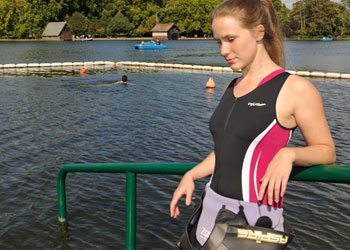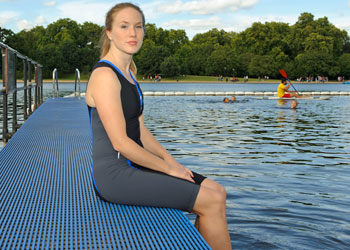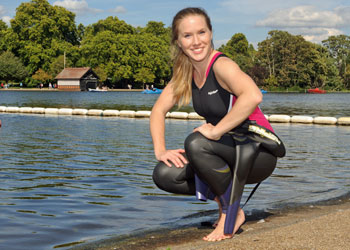Top Tips for Conquering Your Triathlon Swim Fears

Four times out of five*, otherwise perfectly fit and rational people will avoid signing up for a triathlon based on one thing: the swim. The explanations are varied (‘I hate swimming’ ‘I don’t swim’ ‘I dread swimming’ ‘I just got my hair done’) but the meaning is the same. Please don’t make me swim!
If you’ve avoided signing up for a triathlon for just that reason (or you have signed up, but you’re facing the swim with an ever-increasing dread), we bring you Trigirl’s tips for conquering your swim fears.
The fear: You really can’t swim
Get thee to swim lessons! Swim lessons aren’t just for children. There are adult classes available in most leisure centres, from local coaches, even on learn-to-swim holidays. If the desire to do a triathlon isn’t enough reason to consider swim lessons, just think: learning to swim could save your life. Not to mention, holidays are more fun when you don’t fear being anywhere near the water.
The fear: You can swim… but… front crawl?
Many would-be triathletes simply hate the idea of swimming front crawl for more than one length. Maybe it’s the idea of putting their head under water or their feet sink or it’s just plain exhausting!
If you know how to swim, but your front crawl isn’t great, it’s time to employ a triathlon-specific or efficiency-based swim coach. Learning how to swim front crawl efficiently means the difference between an exhausting (and potentially frightening) slog through the water and finishing the swim ready to cycle and run. A triathlon-specific swim coach can offer tips to keep your legs fresh, drills to help with open water sighting, and teach more efficient breathing techniques.
Programs are available throughout the country from Art of Swimming and Swim for Tri amongst others.

The fear: Panic
If you’ve learned to swim, feel comfortable with technique and front crawl efficiency, but worry about panic on race day, you’re not alone. Even some of the most confident swimmers feel a sense of panic when faced with a start gun, a lengthy swim, and a mass swim start. While there is no way to escape this completely, there are a few things that can help.
- Remember that others feel the same way. Knowing that you’re not the only one feeling stressed goes a long way. And in most races, there are plenty of others who are also first-timers!
- Practice the start. Even if it’s just in your swim lane during a training session, practice going out hard, getting your breathing rate and heart rate high, then slowing into a regular, steady pace. Knowing that you’re able to calm yourself after a high-adrenaline start is helpful.
- If you have the opportunity, try a swim race prior to your triathlon. Getting used to the swim before having to worry about the rest will give you valuable experience.
The fear: Open Water
Open water is a completely different feeling that swimming in the safety of your local pool. Again, the key is practice. If you can train or even race in open water prior to event day, DO. A great map of outdoor swimming venues (and ‘wild’ swim spots) can be found here. Get used to not following the black line at the bottom, learn how your goggles work when the water is not chlorinated to crystal-clear, and practice sighting, not just on buoys, but on stationary objects in the distance.
If you have no swimming lakes nearby practice as much as possible in the pool. Get friends together to practice a mass start, incorporate sighting drills, and practice getting into your rhythm.
The fear: I will still panic
 So you may still panic on race day. It’s okay! The key is learning how to calm yourself down and keep going. Have a plan.
So you may still panic on race day. It’s okay! The key is learning how to calm yourself down and keep going. Have a plan.
To help avoid the panic, try to start towards the side or the back of a mass start. Give yourself a second after the start to take a breath, let more aggressive swimmers go, and only then start swimming. If you start feeling panicky, swim a few breaststrokes, or float on your back and breathe until you feel better. Know that you may get your goggles bumped or get kicked. It’s not the end of the world; compose yourself, readjust, and move on. It’s better to lose a few seconds starting at the back or regaining your composure than to feel horrible throughout the swim.
Swimming in triathlon can be a fun part of the challenge rather than something to dread!
See you in the water!
You might also like this motivating and entertaining blog post: When Your Biggest Triathlon Fear Comes True
* a statistic based on personal observation, not scientific research…